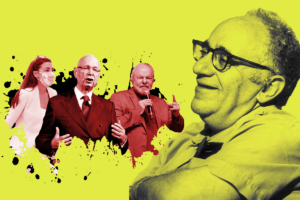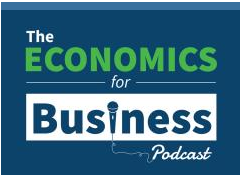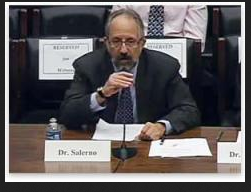Economists and the state are natural enemies. The central principle of economics is that the means for improving human well-being—what economists call “goods”—are naturally scarce and must be produced before they can be used to satisfy human wants. The scarcity principle also implies that, once produced, goods cannot be bestowed on one person without depriving some other person or persons of their use. In other words, there is no such thing as a free lunch. The state and its friends reject the scarcity principle and uphold its polar opposite, the Santa Claus principle, which Ludwig von Mises defined as “the idea that the government or the state is an entity outside and above the social process of production, that it owns something which is not derived from taxing
Read More »Articles by Joseph T. Salerno
Economists and the State: From Enemies to Friends
October 16, 2024What is the Mises Institute?
The Mises Institute is a non-profit organization that exists to promote teaching and research in the Austrian School of economics, individual freedom, honest history, and international peace, in the tradition of Ludwig von Mises and Murray N. Rothbard. Non-political, non-partisan, and non-PC, we advocate a radical shift in the intellectual climate, away from statism and toward a private property order. We believe that our foundational ideas are of permanent value, and oppose all efforts at compromise, sellout, and amalgamation of these ideas with fashionable political, cultural, and social doctrines inimical to their spirit.
[embedded content]
Read More »Have we been living in an MMT world since 2008?
August 7, 2024What is the Mises Institute?
The Mises Institute is a non-profit organization that exists to promote teaching and research in the Austrian School of economics, individual freedom, honest history, and international peace, in the tradition of Ludwig von Mises and Murray N. Rothbard. Non-political, non-partisan, and non-PC, we advocate a radical shift in the intellectual climate, away from statism and toward a private property order. We believe that our foundational ideas are of permanent value, and oppose all efforts at compromise, sellout, and amalgamation of these ideas with fashionable political, cultural, and social doctrines inimical to their spirit.
[embedded content]
Read More »The Birth of the Austrian School
July 29, 2024What is the Mises Institute?
The Mises Institute is a non-profit organization that exists to promote teaching and research in the Austrian School of economics, individual freedom, honest history, and international peace, in the tradition of Ludwig von Mises and Murray N. Rothbard. Non-political, non-partisan, and non-PC, we advocate a radical shift in the intellectual climate, away from statism and toward a private property order. We believe that our foundational ideas are of permanent value, and oppose all efforts at compromise, sellout, and amalgamation of these ideas with fashionable political, cultural, and social doctrines inimical to their spirit.
[embedded content]
Read More »Welcome and Opening Remarks
July 28, 2024What is the Mises Institute?
The Mises Institute is a non-profit organization that exists to promote teaching and research in the Austrian School of economics, individual freedom, honest history, and international peace, in the tradition of Ludwig von Mises and Murray N. Rothbard. Non-political, non-partisan, and non-PC, we advocate a radical shift in the intellectual climate, away from statism and toward a private property order. We believe that our foundational ideas are of permanent value, and oppose all efforts at compromise, sellout, and amalgamation of these ideas with fashionable political, cultural, and social doctrines inimical to their spirit.
[embedded content]
Read More »Have we been living in an MMT world since 2008?
July 25, 2024I recently viewed Finding the Money, a video aimed at persuading a popular audience of the putative merits of Modern Monetary Theory (MMT). The video debuted this past May on several streaming platforms and theaters throughout the U.S. Whether it succeeded or not in its purpose, I will leave it for others to judge. What I found most noteworthy in the 95-minute video was a brief clip of an interview with George Selgin, an economist of some stature in free-market monetary policy circles. When questioned about what MMT proponents get wrong or factually incorrect, Selgin waffles a bit and replies, “it’s a matter of emphasis and rhetoric.” He then goes on to give a more definite answer: “The MM theorists do say there is ultimately a scarcity of resources. But
Read More »Hyperinflation and the Destruction of Human Personality
May 30, 2024The Link between Economic Calculation and Human PersonalityEconomists and historians have clearly shown that the destruction of the value and function of money by hyperinflation makes economic calculation impossible and leads to economic and social disintegration and widespread poverty. What is not so clearly understood, even by many economists, is that during periods of rapid inflation, the inability to economically calculate undermines the very nature of property and causes a withering of the human personality, which is intimately connected with property ownership. By eliminating the means of appraising and rationally allocating one’s property, hyperinflation eliminates the very basis of independent human existence and personality under a system of social
Read More »Hyperinflation and the Destruction of Human Personality
May 2, 2024The Link between Economic Calculation and Human PersonalityEconomists and historians have clearly shown that the destruction of the value and function of money by hyperinflation makes economic calculation impossible and leads to economic and social disintegration and widespread poverty. What is not so clearly understood, even by many economists, is that during periods of rapid inflation, the inability to economically calculate undermines the very nature of property and causes a withering of the human personality, which is intimately connected with property ownership. By eliminating the means of appraising and rationally allocating one’s property, hyperinflation eliminates the very basis of independent human existence and personality under a system of social
Read More »What Fed “Independence” Really Means
April 16, 2024A recent undercover video interview with a Fed economist by a Daily Caller reporter contains explosive revelations about the profoundly anti-democratic doings of the Fed. In the video, Federal Reserve principal economist Aurel Hizmo, a speech writer for Fed Chair Jerome Powell, reveals “classified information” about how Powell deliberately acted to undermine President Trump and expand Fed activities far beyond its legislated monetary policy mission to encompass research on cherished Progressive issues. Hizmo reveals that Powell “hates” Trump and “wants to be remembered in history as. . . someone who held the line against . . . Trump.” Indeed, Hizmo tells the reporter, many things cross Powell’s desk that he says “no” to simply because they are
Read More »Hyperinflation and the Destruction of Human Personality
February 19, 2024Includes an introduction by Tho Bishop. Recorded in Tampa, Florida, on February 17, 2024.
Special thanks to Liberty Villages and the Shrader family for sponsoring this event.
[embedded content]
Tags: Featured,newsletter
Read More »The Myth of the Unchanging Value of Gold
February 12, 2024According to mainstream economics textbooks, one of the primary functions of money is to measure the value of goods and services exchanged on the market. A typical statement of this view is given by Frederic Mishkin in his textbook on money and banking. “[M]oney … is used to measure value in the economy,” he claims. “We measure the value of goods and services in terms of money, just as we measure weight in terms of pounds and distance in terms of miles.”
When money is conceived as a measure of value, the policy implication is that one of the primary objectives of the central bank should be to maintain a stable price level. This supposedly will remove inflationary noise from the economy and ensure that any changes in money prices that do occur tend to reflect a
Why You Should Read Human Action—Very Carefully
January 15, 2024May 16–18, 2024: Join Dr. Joseph T. Salerno, Dr. Thomas J. DiLorenzo, Dr. Jörg Guido Hülsmann, Dr. Joseph T. Salerno, Dr. Mark Thornton, and more for a conference in honor of the 75th anniversary of Human Action at our campus in Auburn. Space is limited. Register here.
There are many good reasons why those who aspire to learn and practice sound economics should read Human Action. However, the reader should approach the book with care and humility. For a book as subtle and profound as Human Action presents several pitfalls for the careless or superficial reader. In these remarks I will briefly cite the most important reasons for reading the book. I will then dwell on a few pitfalls that may ensnare the incautious reader.
So why read Human Action? First and
The Wrong Way and the Right Way to Fix the Fed
December 20, 2023Monetary Policy as Inflationism
Today all governments and central banks operate under the ideology of inflationism. The underlying principle of inflationism is that the quantity and purchasing power of money determined by the free market leads to deflation, recession, and unemployment in the economy. The inflationist ideology is therefore embedded in the very concept of monetary policy, which can be defined as an increase in the supply of money aimed at lowering the purchasing power below the level determined by market forces. In other words, the purpose of monetary policy is perpetual inflation of money and prices.
For the past sixty years there has been a great debate about monetary policy. Some economists argue that monetary policy should be left to the
Today’s Reactionary Reality
February 27, 2023Recorded in Tampa, Florida on February 25, 2023.
[embedded content]
Tags: Featured,newsletter
Read More »Ludwig von Mises’s Monetary Theory in Light of Modern Monetary Thought
February 23, 2023Ludwig von Mises’s contributions to the development of the technical methods and apparatus of monetary theory continue to be neglected today, despite the fact that Mises succeeded exactly eight decades ago, while barely out of his twenties, in a task that still admittedly defies the best efforts of the most eminent of modern monetary theorists, viz., integrating monetary and value theory. Such a unified and truly "general theory" is necessary to satisfactorily explain the functioning of the market economy, because the market economy, or any economy based on social cooperation under the division of labor, cannot exist without monetary exchange and calculation.1
Mises’s work on monetary economics is not only ignored by the roiled mainstream of neo- and "new"
Murray Rothbard versus the Progressives
November 2, 2022There has been a radical change in the social and political landscape in this country, and any person who desires the victory of liberty and the defeat of Leviathan must adjust his strategy accordingly. New times require a rethinking of old and possibly obsolete strategies. —Murray N. Rothbard1
Murray Rothbard wrote the above words in 1994, shortly before his untimely passing. They sum up the main theme of a series of brilliant articles that he published in the 1990s calling for a radical readjustment of libertarian strategy to the new political and social realities that had emerged in the aftermath of the collapse of communism in Eastern Europe and the Soviet Union. In these articles, Rothbard identified both the abstract social philosophy and the concrete
Why I Love “Price Discrimination”
September 1, 2022Last week, I went to a vision center to get my new eyeglass prescription filled. Because I wear progressive lenses with antireflective coating and do not have vision insurance, I anticipated that the out-of-pocket cost of the glasses would be quite high. When I entered the shop and stated my business, the manager immediately asked if I had vision insurance, and I responded that I did not. The manager consulted with a saleswoman and sent her to assist me in choosing frames to try on. I noticed that she was selecting mainly Ray-Bans and other designer frames.
When I questioned her about the price of the frames, she informed me and then hastily added that because I did not have vision insurance, I was eligible for a 20 percent discount on the total price of the
Rothbard vs. the Religion of Progressivism
June 11, 2022Our main text for the Rothbard Graduate Seminar this week is Murray Rothbard’s Power and Market: Government and the Economy, which contains a systematic treatment of one area of economic theory, interventionism. This represents a departure from past seminars in an important respect. Earlier seminars focused on texts by Mises or Rothbard that addressed a much broader scope of their thought. Previous seminar texts such as Man, Economy and State and Human Action over the entirety of economic theory. Human Action, in addition, features a full treatment of methodology as well as discussions of epistemology, political philosophy, and economic history. Other texts used at earlier Rothbard Graduate Seminars such as The Ethics of Liberty and Economic Controversies are also
Read More »Let Unsound Money Wither Away
January 13, 2021[This is a revised version of written testimony submitted to the the Subcommittee on Domestic Monetary Policy and Technology of the Committee on Financial Services, US House of Representatives, “Fractional Reserve Banking and Central Banking as Sources of Economic Instability: The Sound Money Alternative,” June 28, 2012.]
Chairman Paul and members of the subcommittee, I am deeply honored to appear before you to testify on the topic of fractional-reserve banking. Thank you for your invitation and attention.
In the short time I have, I will give a brief description of fractional reserve-banking, identify the problems it presents in the current institutional setting, and suggest a potential solution.
A bank is simply a business firm that issues claims to a fixed
Banking and Monetary Policy from the Perspective of Austrian Economics
May 22, 2020The editors are to be heartily congratulated for putting together this book, which covers an impressive range of topics in monetary economics from an explicitly Austrian perspective. Most of the twelve essays are of a very high quality and one will learn much about money and related topics by a careful reading of them. The chapters range from an insightful interpretation of Austrian monetary theory as a rehabilitation and development of classical monetary theory to novel applications of the theory to current issues such as inflation targeting, the consequences of unconventional European Central Bank (ECB) policies, and cryptocurrencies. In addition to its ambitious scope, this book stands out because most essays take an unabashedly Austrian approach to their
Read More »Money Creation – Not Low Interest Rates – Is Behind the Boom-Bust Cycle
May 6, 2020[unable to retrieve full-text content]In a recent article entitled “Where Are All the Austrian Scholars’ Yachts?” John Tamny has criticized Austrian economists, and Mark Thornton in particular, for their skepticism regarding the relatively “ebullient stock market” in the midst of the pandemic. Mark Thornton responded to Tamny’s main argument in an earlier post. In this post, I will address two serious errors that underlie Tamny’s argument.
Read More »





